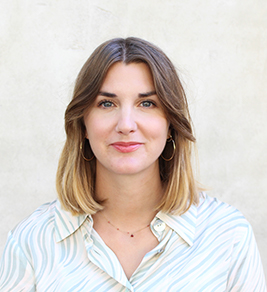Linnea is a social scientist with a background in Political Science and International Relations. Her main research interests are governance processes and political change related to regional development, sustainability and EU policy.
Senior Research Advisor (on parental leave)
Linnea Löfving
Spatial Story
The first thing I do when I come to a new place is to locate where the ocean is. Within the next hours or days, I always make sure to find a high point with an overview of the city. I think it brings me a sense of freedom knowing where I am and where I am going.
The places where I lived all had a special connection to the ocean, Gothenburg, Brighton, Barcelona and Stockholm. And I don’t think I could live in a place where the ocean is not present. The ocean is something that is living, moving and changing and in high contrast to the robust and constant streets and buildings.
After I started studying history and political science at University, travelling became intertwined with discovering new dimensions of a place. I wanted to learn why a country or city had developed in a certain way, why people act or vote in a certain way, why systems look different in different places. I think this is the basis for my interest in policy and why policy is created.
Publications
Löfving, L., Kamuf, V., Heleniak, T., Weck, S., & Norlén, G. (2021). Can digitalization be a tool to overcome spatial injustice in sparsely populated regions? The cases of Digital Västerbotten (Sweden) and Smart Country Side (Germany). European Planning Studies, 30(5), 917–934. https://doi.org/10.1080/09654313.2021.1928053
Moodie, J., Tapia, C., Löfving, L., Sánchez Gassen, N., and Cedergren, E.,. (2021). “Towards a Territorially Just Climate Transition—Assessing the Swedish EU Territorial Just Transition Plan Development Process” Sustainability 13, no. 13: 7505. https://doi.org/10.3390/su13137505
Bourdin, S., Moodie, J., Gassen, N. S., Evers, D., Adobati, F., Amdaoud, M., Arcuri, G., Casti. E., Cottereau, V., Eva, M., Lőcsei, H., Laţu, C., Ibănescu, B., Jean-Pierre, F., Hermet, F., Levratto, N., Löfving, L., Coll-Martinez, E., Psycharis, Y., Salenius, V., & Remete, Z., (2023). COVID-19 as a systemic shock: curb or catalyst for proactive policies towards territorial cohesion? Regional Studies, 58(8), 1543–1556. https://doi.org/10.1080/00343404.2023.2242387
Copus, A., Kahila, P., Dax, T., Kovács, K., Tagai, G., Weber, R., Grunfelder, J., Meredith, D., Ortega-Reig, M., Piras, S. Löfving, L., Moodie, J.R. Fritsch, M. & Ferrandis, A. (2021). European shrinking rural areas: Key messages for a refreshed long-term vision. TERRA: Revista de Desarrollo Local, (8), pp.280-309. DOI: 10.7203/terra.8.20366
Löfving, L., Lundgren, A., (2022), Mälardalsrådets En Bättre Sits-samarbete, Utvärdering av processen 2018-2020, Mälardalsrådet Rapport EBS_220314.indd
Teräs, J., Löfving, L., Huynh, D., Evaluation of the Academy for Smart specialisation, OECD report https://doi.org/10.1787/52360eb2-en
Weber, R., Grunfelder, J. Löfving, L., Moodie, J. (2020) ESCAPE: European Shrinking Rural Areas: ESPON ESCAPE Final Report. ESPON, Luxembourg. https://www.espon.eu/escape
